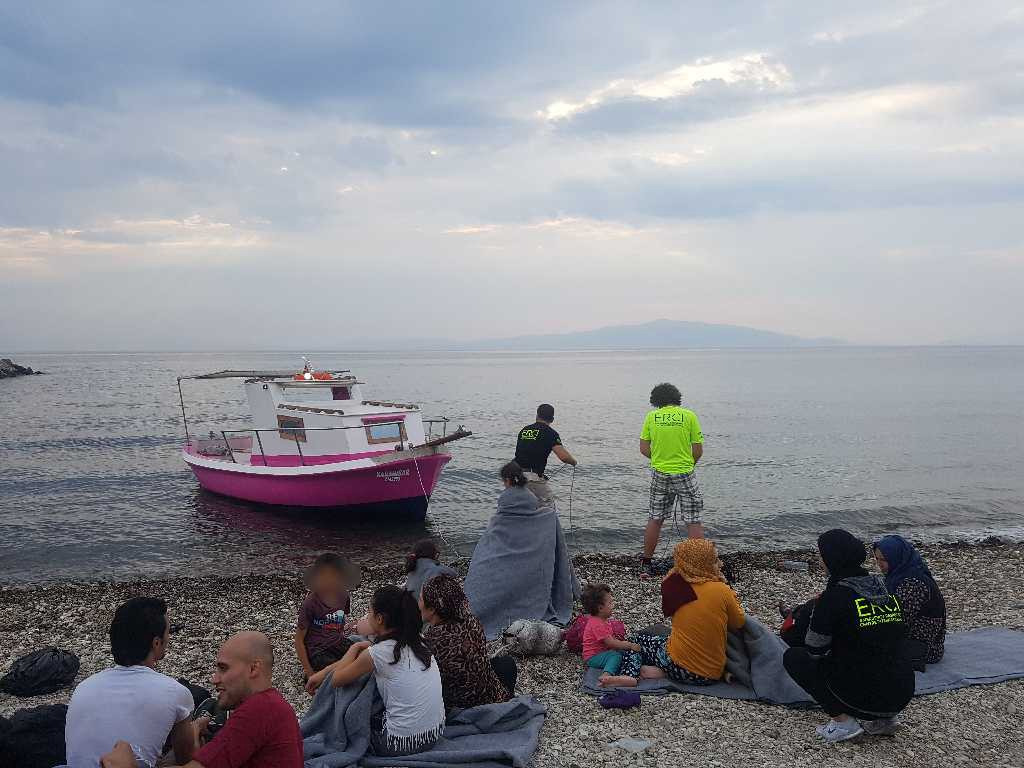By Louise Requin / GICJ
Greece is prosecuting humanitarian rescue workers: along with 22 others, volunteers Sarah Mardini and Sean Binder are facing trial starting on November 18th, 2021. Their crime? Preventing the deaths of stranded asylum-seekers on the shores of Greece by performing search and rescue activities on the island of Lesbos. In the first hearing, the court decided it was incompetent, and the case will be forwarded to a higher court of appeal.

Sarting on November 18th, 2021, humanitarian rescue workers will face trial for their life-saving activities in the Aegean islands. Sarah Mardini a Sean Binder are being charged by the Greek authorities for criminal activities, espionage and smuggling, after they volunteered with former Lesbos-based NGO Emergency Response Center International (ERCI), doing search and rescue work. They were detained for over 100 days in Greece after their arrest in 2018.
Twenty-two others will also face trial for their humanitarian work with refugees in Greece. They come after a long list of humanitarians detained and tried in sham court proceedings for having carried out life-saving operations involving asylum-seekers in the Mediterranean Sea. Charges include espionage, money laundering, human trafficking, migrant smuggling…
According to several national bar associations, the EU parliament and major civil society organizations who reviewed the cases, the charges are unfounded and should be dropped. National legislation in Greece explicitly allows the rescue operations for stranded asylum-seekers. The prosecution accuses NGOs of espionage on account of their efforts to identify stranded boats, or even the legal monitoring of the activities of Hellenic Coast Guard and Frontex. These activities are however perfectly legal as they use public radio channels and are even necessary given the evidence of pushbacks carried out by the coast guards. The police investigation was also unable to correctly substantiate that NGOs had intent to coerce or deceive when collecting people at sea, elements that should be proven in a human trafficking charge. They also purposefully misinterpreted fundraising and operations as money laundering.
This criminalization of humanitarianism is part of Greece’s efforts to restrict humanitarian work dedicated to the migrant population. Along with several trials, the Greek authorities have established a new mandatory registration procedure for NGOs that which to work with asylum-seekers, a policy which further hinders humanitarian work.
Geneva International Centre for Justice (GICJ) calls on the Greek prosecution to drop the charges brought against the defendants. We call for the European Union and UN members states to send observers to the trials and to scrutinize all judiciary proceedings that intend to criminalize life-saving operations. We strongly warn against the dangers of restricting civil society organizations, a worrying trend which has affected several European democracies. Furthermore, the fact that these trials have been drastically under reported is worrying. We call on the UN and the international community to show its support to humanitarian workers and to stand against the criminalization of their activities.
Justice, Human rights, Geneva, geneva4justice, GICJ, Geneva International Centre For Justice












